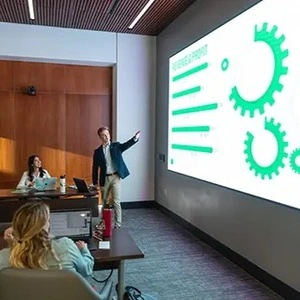
Enroll Anytime Arts, Humanities, and Social Sciences courses
Course Titles
ART 110: Introduction to the Visual Arts
Study of artistic methods and meaning in the visual arts through the analysis of art media and art historical contexts.
ART 230: Introduction to Drawing
This studio course will familiarize students with some fundamental concepts, tools and techniques of drawing. Through hands-on experience, demonstration, lecture, and critique students will gain a greater understanding of drawing as an artistic medium.
CJ 201: Introduction to Criminal Justice
An undergraduate study and overview of the criminal justice system emphasizing the "system," its legal actors and its political constraints. Designed for the beginning student in law enforcement, criminology, corrections, sociology, social welfare, government and pre-law.
ENGL 110: College Composition I
Immersion in college-level critical reading and expository writing, emphasizing revision and careful preparation of manuscripts. The credit from this course will not count toward an English major or minor at UND.
ENGL 130: Composition II: Writing for Public Audiences
Emphasizes rhetoric and genre analysis, research, information literacy, and writing processes. Students practice and produce researched writing with explicit purposes for a variety of professional and public audiences. The credit from this course will not count toward an English major or minor at UND.
FA 150: Introduction to the Fine Arts
Introduction to the fundamental principles of the Fine Arts -- Visual Arts, Music, Theatre, and Dance -- followed by examples of the interaction of the arts in selected cultures from history and around the world and at a variety of campus arts events, in order to increase appreciation of the importance of the fine arts to the individual and community.
GEOG 151: Human Geography
A systematic analysis of people's cultural regions including settlement patterns and change via migration and diffusion.
GERM 406: Literary Voices: Death & Apocalypse
Introduction to masterpieces of German, Austrian, and Swiss literature in English. Possible course topics include Holocaust literature, the Grimms' fairy tales, the monstrous, the uncanny, and the fantastic.
HIST 101: Western Civilization I
An interpretive survey of Western Civilization from earliest times to the close of the European Middle Ages.
HIST 102: Western Civilization II
A comprehensive survey of Western Civilization from the Reformation to the present, with emphasis on movements and institutions common to Western Europe and their influence on the rest of the world.
HIST 103: United States to 1877
A survey of early American history, including old world background, transformation of British institutions into American institutions, revolution, and the establishment of the Union with its temporary breakup in Civil War.
HIST 104: United States Since 1877
A survey of the history of the United States since Reconstruction, including the transformation of an isolationist, agrarian nation into an urban industrial and world power with attention to the resulting domestic social, economic and political changes.
LANG 380: Global Gateways
A window to the interdisciplinary nature of cultural practices and traditions around the world, this course will explore an understanding of culture as historical, literary, linguistic, visual, and performative. Through reading, writing, and discussion to foster advanced communication, students will be expected to engage and examine intercultural contexts and complexities.
MUSC 201: Rock and Roll History: From World War II to 1975
This class will give students a survey of the major styles, periods, and influence-streams that make up the extremely large and varied category of "Rock" music produced between World War II and 1975. The course covers many styles, but the focus is on English-language mainstream popular music.
PHIL 250: Ethics in Engineering and Science
This course centers on the ethical issues of particular concern to both citizens and professionals involved in engineering and related technical/scientific fields.
POLS 115: American Government I
An introduction to political science through the study of the American political system: The Constitution; the political processes; the structure, powers and procedures of the Presidency, Congress, and the Judiciary.
POLS 220: International Politics
An introduction to international politics with emphasis on the international system, the major actors, the struggle for power, and the struggle for order.
PSYC 111: Introduction to Psychology
A survey of the scientific study of behavior and mental processes, with consideration of the nature and scope of psychology as a science and a profession.
PSYC 241: Statistics for the Behavioral Sciences
An introduction to statistics commonly used in psychology and other behavioral sciences. Topics include descriptive and inferential statistics, measures of central tendency and variability, z-scores and the normal distribution, probability and hypothesis testing, t-tests, analysis of variance, correlation, regression, and non-parametric tests. Students will apply these statistical concepts to research scenarios in the behavioral sciences. Students will also learn about software used to compute statistics.
PSYC 250: Developmental Psychology
A survey of the psychology of human life span development including intellectual, social, and emotional aspects of the normal individual and emphasizing childhood and adolescent development.
PSYC 270: Psychological Disorders and Treatment
A survey of the classification, symptoms, and etiology of psychological disorders and behavior pathology.
PSYC 303: Research Methods in Psychology
Survey of research methods; exposure to and evaluation of psychological research; includes an overview of APA format.
PSYC 335: Health Psychology
A biopsychosocial approach is used to examine basic concepts, theories, and research in health psychology from the perspectives of the patient, caregiver, health care provider, and researcher.
PSYC 360: Introduction to Personality
Examination of basic concepts in the field of personality.
PSYC 361: Social Psychology
Research on individual behavior in its social context: how the individual acts upon the social environment, and interacts with other individuals.
PSYC 405: History and Systems of Psychology
A consideration of the historical background and development of problem areas in psychology and a survey of contemporary psychological theories.
PSYC 439: Cognitive Psychology
An examination of theory and research on attention, memory, language, comprehension, reasoning, problem-solving, and decision-making. Course includes recitation and laboratory.
SOC 110: Introduction to Sociology
A systematic examination of the social components of human behavior, including the norms, laws, cultural patterns, and economic forces that organize everyday life. Students will analyze theories of society, the structure of social institutions, social conflict and stratification, as well as social interactions among diverse groups of people.
SOC 355: Drugs and Society
Social factors affecting use and control of self-administered psychoactive drugs, including alcohol, cigarettes, marijuana and more illicit substances. Topics include social definitions, causes, controls and consequences of drug problems.
WGS 225: The Study of Women
An introduction to the study of women as subjects of scholarly inquiry, with emphasis on transnational feminism and assessments of women's contributions around the globe. The course will provide an interdisciplinary focus on the central issues and questions posed by the new scholarship on women, and introduce students to the perspectives and methodologies of a variety of disciplines.
Find Your Self-Paced Enroll Anytime Course
Why Take Online Classes at UND?
Here are a few reasons why you should take an online enroll anytime course at UND:
- Great customer service – Our registration team is ready to answer questions quickly so you can focus on your coursework.
- Affordable – UND's enroll anytime courses are priced at North Dakota's affordable, in-state tuition rate.
- Accredited – UND is accredited by the Higher Learning Commission.
- Easily transfer credits – Transferring credits is always at the discretion of the institution to which the credits are being transferred. In general, credits from schools/universities that are regionally accredited by the Higher Learning Commission transfer to other regionally accredited institutions. UND's online courses appear on your UND transcript in the same way as other courses.
Flexible 100% Online Course
You'll take this online course at your own pace. Some students thrive in this environment, while other students may struggle with setting their own deadlines. If you have successfully taken an independent study or correspondence course previously, UND’s enroll anytime courses may be right for you. Still not sure? Take our online quiz to help determine if online enroll anytime courses are right for you.
Course information including tuition, technology requirements, textbooks, lessons and exams is subject to change without notice.
How will the course appear on my transcript?
You may enroll at any time and have up to 9 months to complete this online course.
The credits earned will be recorded on your UND transcript based on the date you registered
for the course. It will appear on your transcript in the same way as a course taken
during a regular semester. There is no indication that the course was taken online
or that you completed it at your own pace.
Consult the table on our How Enroll Anytime Courses Work page for a current listing of Enroll Anytime Registration Dates and the semester
information that will appear on a UND transcript.




